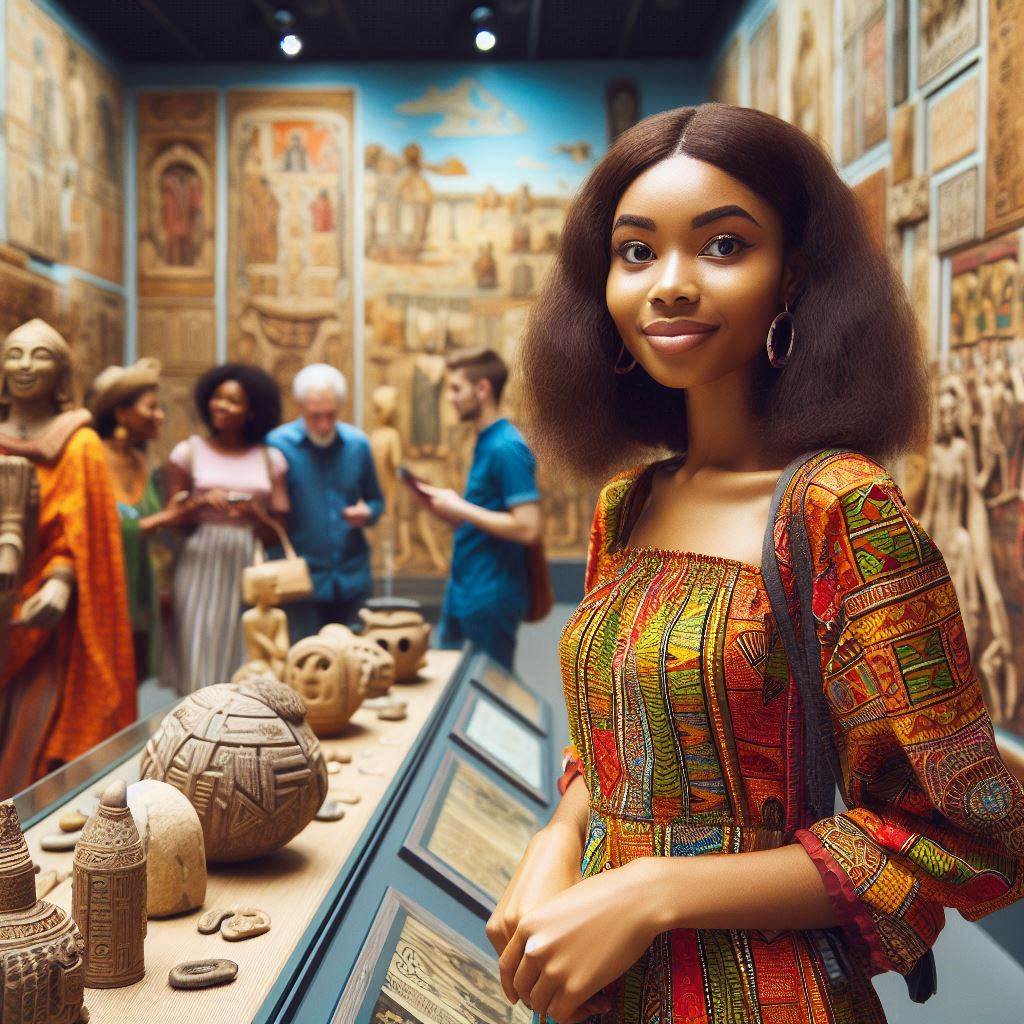Introduction
Museums play a crucial role in Nigerian history education. They preserve and showcase Nigeria’s rich cultural heritage. These institutions provide tangible connections to the past, making history accessible and engaging.
Importance of Museums in Preserving Cultural Heritage
- Conservation of Artifacts: Museums protect valuable artifacts from Nigeria’s diverse cultures.
- Cultural Preservation: They preserve traditional crafts, artworks, and historical documents.
- Heritage Sites: Museums serve as heritage sites that connect present and future generations to their roots.
Relevance of Museums in Public Education
- Educational Programs: Museums offer educational programs and workshops for schools and communities.
- Interactive Exhibits: Interactive exhibits make learning about history engaging and memorable.
- Public Awareness: They raise public awareness about Nigeria’s historical events and cultural milestones.
Museums in Nigeria are vital in teaching and preserving the nation’s history. They ensure that the rich cultural heritage remains alive and appreciated by all.
Historical Significance of Museums in Nigeria
Evolution of Museums in Nigeria
- Museums in Nigeria have a rich history dating back to the colonial era.
- The first museum in Nigeria was established in 1945 in Lagos by the British colonial government.
- Over the years, museums have evolved from being colonial institutions to showcasing Nigerian culture.
Oldest and Most Prominent Museums
- National Museum, Lagos: One of the oldest and most prominent museums in Nigeria
- National Museum, Benin City: Known for its collection of artifacts from the Benin Empire.
- National Museum, Jos: Focused on the cultural heritage of the people of Plateau State.
Role in Documenting Nigeria’s History
- Museums serve as repositories of Nigeria’s history, preserving artifacts and artworks.
- They help in documenting the diverse cultures and traditions of the various ethnic groups in Nigeria.
- Museums play a crucial role in educating future generations about Nigeria’s past.
Read: Developing Critical Thinking in Language Arts
Role of Museums in Education
When it comes to education, museums play a crucial role in providing a unique and immersive learning experience for students, researchers, and the general public in Nigeria.
Let’s delve into the various educational programs and activities offered by museums in the country.
Educational Programs and Activities
- Museums in Nigeria offer a wide range of educational programs tailored to different age groups and interests.
- These programs include guided tours, workshops, lectures, hands-on activities, and special exhibitions.
- Students have the opportunity to learn about various aspects of Nigerian history, culture, science, and art through interactive experiences.
- Researchers can access archives, libraries, and collections that provide valuable resources for academic study and research.
- The general public can attend lectures, film screenings, and cultural events that enhance their knowledge and appreciation of Nigerian heritage.
Museums as Learning Hubs
- Museums serve as learning hubs where students can explore and engage with historical artifacts, artworks, and scientific displays.
- Students can connect with the past and gain a deeper understanding of Nigeria’s rich cultural heritage through firsthand experiences.
- Researchers can conduct in-depth studies and analysis of museum collections to expand their knowledge and contribute to academic scholarship.
- Visitors of all ages can participate in educational programs that promote critical thinking, creativity, and cross-cultural understanding.
Valuable Resources and Artifacts
- Museums house a vast array of valuable resources and artifacts that are essential for historical education in Nigeria.
- These resources include archaeological finds, traditional crafts, historical documents, photographs, and multimedia installations.
- Students and researchers can utilize these artifacts to gain insights into the past and reconstruct narratives that shape our understanding of Nigerian history.
- Artifacts serve as tangible links to the past, allowing visitors to connect with historical events, traditions, and cultural practices.
- By preserving and showcasing these artifacts, museums contribute to the preservation and dissemination of Nigeria’s cultural heritage for future generations.
Therefore, museums in Nigeria play a vital role in promoting historical education by offering diverse educational programs, serving as learning hubs, and providing valuable resources and artifacts.
It is imperative to recognize the significance of museums in preserving and promoting Nigeria’s rich cultural legacy for generations to come.
Read: Student Experiences: Life in Communication Arts
Promotion of Cultural Awareness and Appreciation
Museums play a crucial role in promoting cultural awareness and appreciation among Nigerians. Here are some ways museums achieve this:
- Displaying artifacts: Museums showcase various artifacts that represent different aspects of Nigerian culture, history, and traditions.
- Educational programs: Museums organize workshops, lectures, and guided tours to educate the public about Nigeria’s cultural heritage.
- Interactive exhibits: Museums offer interactive exhibits that engage visitors and provide a hands-on experience of Nigerian culture.
- Preserving heritage: Museums help in preserving and safeguarding Nigeria’s diverse cultural heritage for future generations.
- Community involvement: Museums engage local communities in cultural activities, fostering a sense of belonging and pride in their heritage.
Importance of Preserving and Showcasing Nigeria’s Diverse Cultural Heritage
Preserving and showcasing Nigeria’s diverse cultural heritage through museums is crucial for several reasons:
- Promoting understanding: By showcasing artifacts and exhibits, museums help Nigerians understand and appreciate their cultural roots.
- Celebrating diversity: Nigeria is home to various ethnic groups with unique traditions, and museums celebrate this diversity through their collections.
- Connecting the past and present: Museums bridge the gap between the past and the present, showcasing how Nigeria’s cultural heritage has evolved over time.
- Creating cultural pride: By preserving and showcasing cultural heritage, museums instill a sense of pride and identity in Nigerians.
- Boosting tourism: Nigeria’s cultural heritage attracts tourists, and museums play a key role in promoting cultural tourism in the country.
Contribution to Fostering a Sense of National Identity and Pride
Museums contribute significantly to fostering a sense of national identity and pride among Nigerians:
- Showcasing history: Museums display historical artifacts and documents that narrate Nigeria’s journey as a nation, instilling a sense of national pride.
- Promoting unity: By highlighting Nigeria’s diverse cultural heritage, museums promote unity among citizens, regardless of their ethnic backgrounds.
- Encouraging dialogue: Museums serve as platforms for conversations about Nigeria’s history and cultural identity, creating a shared national narrative.
- Inspiring future generations: Through educational programs and exhibits, museums inspire young Nigerians to learn about their heritage and contribute to the nation’s development.
- Preserving legacy: Museums play a vital role in preserving the legacy of Nigeria’s past generations, ensuring that their contributions are not forgotten.
Read: How to Apply for Communication Arts Programs

Collaboration with Educational Institutions
One of the crucial partnerships that museums in Nigeria have formed is with educational institutions. This collaboration plays a significant role in enhancing history education in the country.
Partnership between Museums and Educational Institutions
- Museums often work closely with schools and universities to provide educational resources and support for history education.
- Through partnerships, museums offer access to historical artifacts, documents, and exhibitions that supplement classroom learning.
- Educational institutions, in turn, benefit from the expertise of museum staff and curators who help enrich history curriculum.
Valuable Resources and Support Provided by Museums
- Museums serve as repositories of cultural heritage and historical knowledge, offering a wealth of resources for students and educators.
- They provide access to primary sources and artifacts that allow students to engage with history in a tangible and immersive way.
- Through workshops, lectures, and guided tours, museums help educators integrate experiential learning into their history programs.
Benefits of Students Visiting Museums
- Visiting museums as part of their curriculum allows students to have a firsthand experience of historical events and artifacts.
- It helps them develop critical thinking skills, analytical abilities, and a deeper appreciation for cultural heritage.
- Students also benefit from interacting with knowledgeable museum staff who can provide insights and context to historical narratives.
In short, the collaboration between museums and educational institutions in Nigeria is essential for enriching history education.
By providing valuable resources and support, museums enhance students’ learning experiences and contribute to a more holistic understanding of Nigerian history.
Read: Famous Nigerian Alumni of Communication Arts Programs
Preservation of Nigerian History
When it comes to the preservation of Nigerian history, museums play a crucial role in safeguarding the country’s historical artifacts and documents.
Museums act as repositories of the past, holding valuable items that allow us to trace and understand our roots.
Conservation and Restoration of Cultural Heritage
Through their specialized conservators, museums take on the responsibility of preserving and restoring cultural artifacts.
They employ various techniques to ensure that these items are protected from deterioration and damage.
From ancient pottery to intricate textiles, museums invest time and resources in maintaining the integrity of Nigeria’s cultural heritage.
Ensuring Access for Future Generations
Museums serve as educational institutions, offering a window into the past for present and future generations.
By displaying artifacts and providing historical context, museums help bridge the gap between past and present.
They make history come alive, allowing visitors to connect with their heritage on a personal level.
Importance of Museums in Preserving Nigeria’s History
Without museums, many important artifacts would be at risk of being lost or destroyed.
They serve as guardians of our cultural identity, preserving the stories and traditions of our ancestors.
Museums contribute to the collective memory of a nation, ensuring that our history is not forgotten.
In review, museums play a vital role in preserving Nigerian history for future generations.
Through their dedication to conservation and restoration, museums ensure that our cultural heritage remains intact.
By providing access to historical artifacts, museums help us connect with our past and understand where we come from.
Conclusion
In closing, museums play a vital role in shaping Nigerian history education by providing tangible artifacts and exhibits that bring history to life. They serve as educational institutions that offer a hands-on experience of Nigeria’s rich cultural heritage.
Museums are essential in preserving Nigeria’s history, educating the public about past events, and promoting a sense of national identity. Through exhibitions, workshops, and guided tours, museums help to connect people with their heritage.
Visiting museums not only provides a window into the past but also fosters a deeper understanding and appreciation for Nigeria’s diverse history.
By engaging with historical artifacts and stories, visitors can gain insights into the struggles, triumphs, and traditions that have shaped the country.
Therefore, it is crucial for individuals to take advantage of the resources available at museums to enrich their knowledge of Nigeria’s past.
By exploring museums and learning about their country’s history, people can develop a deeper connection to their roots and a sense of pride in Nigeria’s cultural legacy.
Ultimately, museums are more than just repositories of artifacts – they are invaluable centers of learning and enlightenment that contribute to the preservation and promotion of Nigeria’s cultural heritage.
We encourage everyone to visit museums, engage with their history, and help to perpetuate the legacy of Nigeria for future generations.




